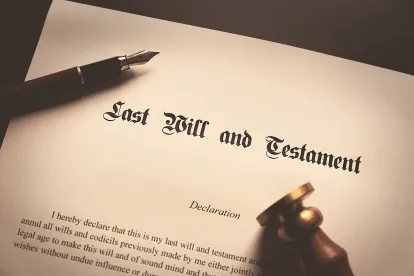A deceased individual (i.e., the decedent) has often taken the initiative during his or her lifetime to create a will designating the individuals who will receive the decedent’s remaining assets. However, the decedent may inadvertently cause difficulties after his or her death because of the decedent’s unfamiliarity with the legal requirements for a will and the probate process. The following are several considerations for a decedent to consider during their lifetime to prevent post-death issues for his or her personal representative.
Does the personal representative have access to the original will?
After every decedent’s death, the personal representative has 30 days to file the wet signature copy of the decedent’s executed will (i.e., the original will) with the probate court in the decedent’s county of residence.1 For example, if the decedent resided in Madison, Wisconsin, the personal representative must file the original will with the Dane County Probate Office. Therefore, it is crucial that the decedent keeps their original will in a location that is accessible to the personal representative. The probate court will only allow a copy of the will to be filed if the personal representative proves that the original will could not be found after a thorough and careful search.
One common mistake is that the decedent believes the most secure and safe place to keep the original will in is their safe deposit box. However, if the decedent has not authorized the personal representative to access the decedent’s safe deposit box, the personal representative will not be able to easily retrieve the will after the decedent’s death. Some financial institutions will allow a personal representative to access the safe deposit box for the limited purpose of checking for the original will, but many financial institutions will only allow the personal representative to access the safe deposit box with the authorization of the probate court. The personal representative is then caught in a chicken-and-the-egg scenario as the financial institution will not allow access to the safe deposit box without the authorization of the probate court and the probate court is reluctant to grant an authorization without seeing that the personal representative is appointed in the will.
Did the decedent self-prove his or her will?
For Wisconsin residents, a will is valid if it is signed by the decedent and two witnesses.2 However, unless the decedent and witnesses also sign a self-proving affidavit before a notary, the court will likely require one of the witnesses to testify to the validity of the will.3 This causes additional issues for the personal representative who must decipher the signatures on the will to determine who witnessed the will and track down a surviving witness.
Did the decedent obtain disinterested witnesses?
When signing his or her will, the decedent may attempt to simplify the signing process by asking his or her family members to act as the witnesses. However, the Wisconsin statutes require witnesses to be disinterested individuals.4 A disinterested witness is a witness who is not related to the decedent and is not receiving any benefit under the decedent’s estate plan.
Has the decedent clearly designated the recipients of their tangible personal property?
The greatest issues with a decedent’s estate are often related to the distribution of items of sentimental personal property, such as a wedding ring or a butterfly collection. If the decedent knows that several beneficiaries will be interested in receiving a particular item of personal property, the decedent should clearly describe the item and the recipient in a separate writing for tangible personal property to accompany the decedent’s will. Unlike the will, which must be witnessed and notarized, a separate writing only needs to be signed and dated by the decedent.5 Therefore, the decedent can easily destroy and resign a separate writing to keep the separate writing up-to-date.
If the decedent disposes of one of the items listed on the decedent’s separate writing, the decedent should prioritize signing an updated separate writing that does not include that item. If the decedent’s separate writing lists items that are no longer owned by the decedent, the personal representative could be accused of losing or stealing the item by the recipient. The decedent should also insure that the separate writing describes the items in sufficient detail for the personal representative to identify the particular item. If the separate writing gives “my porcelain tray to my niece, Mary,” but the decedent owns four porcelain trays, the personal representative must guess which porcelain tray the decedent intended to give to Mary. The decedent could avoid this confusion by attaching a picture of the porcelain tray to the separate writing.
FOOTNOTES
1 Wis. Stat. § 856.05(1).
2 Wis. Stat. § 853.03.
3 Wis. Stat. § 843.04.
4 Wis. Stat § 853.07(2)(c).
5 Wis. Stat. § 853.32(2)(a)(1).



 />i
/>i

